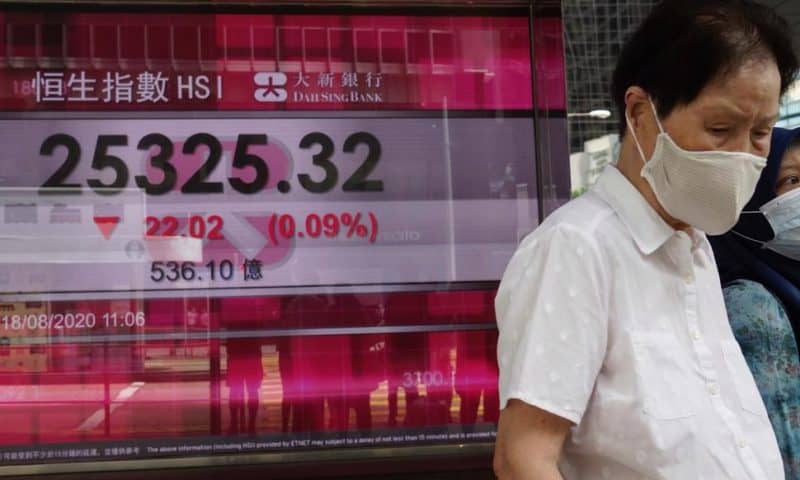Shares are mixed in Asia after a rally in technology stocks pushed the S&P 500 closer to its record high.
Shares were mixed in Asia on Tuesday, after buying of technology stocks nudged the S&P 500 closer to the record high it set in February before the pandemic crunched the global economy.
Benchmarks fell in Hong Kong, Tokyo and Seoul but rose in Sydney and Shanghai.
Markets were buoyed by developments in Washington, as Speaker Nancy Pelosi called the House back into session, cutting short the lawmakers’ summer recess for a vote expected Saturday on legislation to prohibit changes in the U.S. Postal Service amid growing concerns that the Trump administration is trying to undermine the agency ahead of the November election.
The proposed package will also include $25 billion to shore up the Postal Service, which faces continued financial losses. But prospects for additional economic aid for American workers and businesses remain uncertain after talks on a fresh stimulus package stalled.
Investors say it’s crucial that the support comes, particularly after $600 in weekly unemployment benefits and other stimulus from the U.S. government expired.
“The markets are in ‘show me the money’ mode, perhaps erring on the side of caution, not holding their breath for an imminent deal in Congress,” Stephen Innes of AxiCorp said in a commentary. “Sadly, this leaves the U.S. real economy waddling and many businesses and millions of consumers getting the short shrift.”
Hong Kong’s Hang Seng index lost 0.1% to 25,320.16 while in Tokyo, the Nikkei 225 slipped 0.5% to 22,972.43. South Korea’s Kospi slumped 0.7% to 2,391.87. Australia’s S&P/ASX 200 gained 0.3% to 6,094.20, while the Shanghai Composite index edged 0.1% higher, to 3,441.41.
Without more help for the U.S. economy, analysts say the recovery that investors have been assuming is on the way won’t materialize. And that assumption is a huge reason the stock market is as high as it is.
Still, on Monday the S&P 500 picked up 9.14 points, or 0.3%, to 3,381.99. Earlier in the day, it briefly crossed above its record closing level of 3,386.15, which was set on Feb. 19 before the pandemic shut down businesses worldwide and created the worst recession in decades.
The Nasdaq composite rose 1% to 11,129.73, and smaller stocks in the Russell 2000 index gained 0.5%, to 1,585.47. The Dow Jones Industrial Average was an outlier, slipping 0.3% to 27,844.91.
Tech stocks across the S&P 500 climbed 0.5%, accounting for about two-thirds of the index’s gain. Nvidia jumped 6.7% for one of the biggest gains in the index, and Microsoft added 0.7%.
But losses for financial and energy stocks helped restrain the market’s gains. These areas tend to rise and fall with expectations for the economy, and they had been showing a bit more life in recent weeks in an encouraging sign for market watchers.
Shares of several banks were under pressure Monday after Warren Buffett’s Berkshire Hathaway disclosed that it cut back its investments in them. Wells Fargo slumped 3.3% after the famed value investor trimmed Berkshire Hathaway’s ownership stake by about a quarter.
Treasury yields moderated a bit, following the big run for the 10-year yield last week. It dipped to 0.68% from 0.71% late Friday. It had zoomed upward from 0.56% through last week.
Higher yields can be an indication that investors are upgrading their expectations for inflation and the economy. But they can also pull some buyers away from stocks into bonds, hurting stock prices in the process.
Benchmark U.S. crude oil gave up 24 cents to $42.64 per barrel in electronic trading on the New York Mercantile Exchange. It added 88 cents to settle at $42.89 per barrel on Monday. Brent crude, the international standard, lost 22 cents to $45.15.
In currency dealings, the U.S. dollar weakened to 105.62 Japanese yen from 105.98 yen. The euro rose to $1.1889 from $1.1873.
Gold for delivery in December climbed 30 cents to $1,999.10 per ounce.

